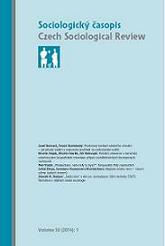„Předevčírem, nebo kdy to bylo?“: Temporalita třídy nejchudších
‘Yesterday, or when was it?’ – The Temporality Practices of the Poorest Class
Author(s): Petr VašátSubject(s): Social Sciences
Published by: AV ČR - Akademie věd České republiky - Sociologický ústav
Keywords: homeless; poorest class; temporalisation; past – present – future; time-reckoning; rhythm of everyday practices; tactical nature of time; ethnography
Summary/Abstract: The article seeks to describe the poorest class’s notion of time and through this critically address the prevailingly one-dimensional and unproblematised conception of time in the Czech social sciences. The relational concept of the poorest class here refers to individuals united by specific social practices and strategies that are determined by their position and mutual proximity within a social space. The article’s theoretical framework is anthropologist Nancy Munn’s practice-based or agent-oriented approach to time and space, according to which socio-cultural practices do not just occur in time and space but also create or produce that time and space. The concept of temporalisation (time and space) is used in this respect to refer to a variegated, symbolic process whose forms can encompass different degrees of awareness and consideration of the dimension of time. Through the optics of this theoretical approach the article examines four dimensions of agent-based temporalisation: (1) the tactical nature of time, (2) the relation between past, present, and future, (3) time reckoning, and (4) the rhythm of everyday practices. The text presents data from ethnographic field research conducted in the urban setting of the City of Pilsen. The aforementioned dimensions of time are understood as a reflection of social structures, that is, of the position of agents in a social space associated with poverty and marginalisation.
Journal: Sociologický časopis / Czech Sociological Review
- Issue Year: 50/2014
- Issue No: 01
- Page Range: 57-82
- Page Count: 26
- Language: Czech

